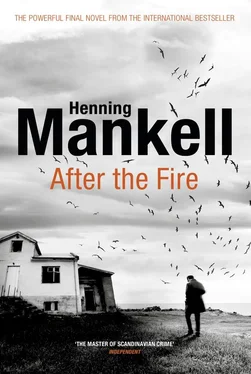That’s what it felt like as I headed home from Jansson’s island. It was as if Stångskär had metamorphosed into a fortress where Jansson had hidden himself with all his secrets. I now knew what I had understood, but I didn’t understand what it was that I knew. Jansson had become transparent, yet at the same time he was far, far away. If I stretched out my hand, I would never be able to reach him.
I switched off the engine and tried to think, but my head was all over the place.
I continued my journey home; as I reached the bay I saw someone moving around outside my tent on the skerry. I turned into a narrow inlet that is navigable only in a small boat like mine. This enabled me to approach the skerry from the side where a high rock face made it impossible for anyone to see me from the tent. Like a hunter I was also careful to stay downwind of my prey. I killed the engine and used the oars instead. Rowing this boat was hard work, even when I flipped up the engine.
My head was full of Jansson, but there was still a little bit of room left to find out who was using my tent and my skerry.
I hove to next to the steep cliff, where a number of depressions in the rock made it possible to scramble ashore. I remembered carving my name at the water’s edge in this very spot when I was a teenager, but there was no trace left now. I crawled across the rock like a clumsy lizard to see who was outside my tent, but there was no one in sight. Whoever it was had gone inside and zipped up the flap. Two separate strands of distaste and anxiety were fighting for space inside my mind: Jansson’s insanity and a concern that the person in the tent would turn out to be violent.
The surfboard and sail lay where I usually left my boat, looking like an insect that had been washed ashore.
I took a step away from the tent and accidentally kicked a pile of stones. Before I had time to scurry back to the boat, the tent flap opened.
The boy was fair-haired and couldn’t have been more than seventeen years old. He was wearing a black neoprene suit and I immediately noticed a tear on one shoulder, which he had made a reasonable job of repairing with masking tape. His eyes were dark; I couldn’t tell whether he was afraid or simply watchful. There was something about his hair that bothered me: it was too blond, too white. It looked as if it had been dyed by someone who didn’t really know what they were doing. But why had he changed the colour of his hair? In order to become someone else or because of an impatient desire to make himself different?
I signalled to him to come out; for some reason I didn’t think he spoke Swedish. He crawled out and sat down; I sat down too. My anxiety was gradually giving way to a growing curiosity.
‘I haven’t taken anything,’ he said suddenly. ‘I have only rested.’
He spoke Swedish with a slight accent; perhaps he came from the north?
I was about to ask him his name when he leaped to his feet and ran towards his surfboard. It happened so fast that I only just had time to get up. He pushed the board out into the water and jumped onto it. He was extremely agile, moving like a sure-footed animal with a gleaming black coat. There was enough wind to fill his sail.
I was overcome with a strange mixture of fury and impotence. I yelled after him, ‘Hey! Hey you!’
With hindsight I can’t think of a more pointless thing to shout. He didn’t turn around, of course. I watched him disappear around the southern headland.
Soon the ice would form, and he would no longer be able to windsurf.
The tent flap was fluttering in the breeze. I crouched down and drew it back. There wasn’t much inside, just an empty plastic bottle, several screwed-up pieces of paper and the remains of a packet of biscuits. I crawled in and smoothed out the sheets of paper. They looked as if they had been torn off a squared pad. On some of them he had played noughts and crosses with himself. Several of the games were unfinished, with no winner.
There was some writing on one of the pages. His handwriting was ornate, almost old-fashioned. It took me a little while to work out what it said.
The same text was repeated twice, like a refrain:
Some poems fade away in days
Then daybreaks and dreams
Have agreed on a victor
I could read the words but found it difficult to understand what he meant. Was it a poem or a message he had decided not to send to an unknown recipient? Was it for me, the man who had put up the tent and provided him with a refuge?
I tucked the piece of paper in my pocket and left the tent. With some difficulty I managed to scramble up the steep cliff to the top, where I could look out across the bay.
There was no sign of him. He could be hiding among the islets in the small archipelago known as Hällarna, which is unnamed on maritime charts.
A little further out lay Satansgrundet, or the Devil’s Reef, which was shaped like a chopped-off pillar sticking straight up out of the sea. He could hide there if that was what he wanted.
I stayed at the top of the cliff until I started shivering. Back at the tent I took a pen out of my pocket and wrote a note on the reverse of one of the unfinished games of noughts and crosses.
Nice poem. You’re welcome to use the tent, but naturally I’m curious about who you are.
I thought for a moment, then signed it: Fredrik . I added my phone number, then I placed the piece of paper in the middle of the groundsheet, zipped up the flap and set off for home.
I wondered what the boy’s name might be. He was no Erik or Anders — then again perhaps that’s exactly what he was?
It occurred to me that the only person I knew who would have done the same thing was my daughter. In a way he was her brother. He was a visitor from a new age that I would only have time to brush up against.
I hoped he would get in touch.
I didn’t start the engine, I simply allowed the boat to drift towards my island. Dusk was beginning to fall. The ice would come late this year.
A few weeks of intense cold followed. The ice reached further and further out to sea. I lay in the caravan listening to the movement of the sea and the ice. If I placed my hand on the wall, it soon felt chilled to the bone. However much I turned up the heating, there was a constant battle between the bitter cold outside and the heat inside.
Needless to say I spent a great deal of time thinking about Jansson and the discovery I had made at his house on Stångskär. I have never experienced so many confused and contradictory emotions, not even when I botched the operation that destroyed my life as a doctor. I brooded about him during the day and dreamed about him at night. On several occasions I sat there clutching my phone, ready to call the police, but I just couldn’t do it. The idea that Jansson could have let me burn to death in my house was too improbable, too appalling.
I think I was most afraid of the day Jansson would return from his mysterious trip. How would I confront him? He had said he would be away for three days, but several weeks had passed.
There were days when I walked around in the cold stillness of feeling as if I were confined in a cage. I forced myself to carry on taking a dip each morning, but not even the icy water could make me think more clearly. In my head Jansson had been transformed from a friendly seafaring postman into something that could only be described as a monster.
I spoke to Louise every day; Agnes was now fully recovered. I didn’t ask any questions about how they lived their life or where they got their money from. I found it difficult to imagine Louise going out and earning her money as a pickpocket with a baby at home, but I had no way of knowing, and perhaps I didn’t want to know.
Читать дальше












